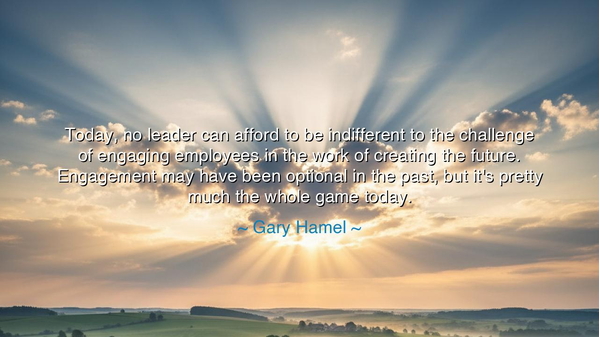
Today, no leader can afford to be indifferent to the challenge of
Today, no leader can afford to be indifferent to the challenge of engaging employees in the work of creating the future. Engagement may have been optional in the past, but it's pretty much the whole game today.






"Today, no leader can afford to be indifferent to the challenge of engaging employees in the work of creating the future. Engagement may have been optional in the past, but it's pretty much the whole game today." These words, spoken by Gary Hamel, speak to the profound transformation in leadership and the shifting demands of the modern world. The art of leadership is no longer just about giving orders or managing resources—engagement has become the heart of progress. In the past, leaders could command and expect results, but today, the true measure of leadership lies in the ability to inspire, motivate, and deeply engage the hearts and minds of the people they lead. This shift, while gradual, has now become an undeniable truth: without employee engagement, the future is lost before it even begins.
In the ancient days, kings and emperors led by command and authority, and their word was law. The success of their reign often depended on their ability to command armies or direct the labor of their people. But even in those times, there were leaders who understood that engagement—the ability to inspire loyalty and passion—was a far more powerful force than mere obedience. Alexander the Great, for instance, understood the importance of his soldiers’ hearts and minds. He did not merely command them with fear; he led them with a vision of greatness, of glory, and of an empire that would be theirs to shape. It was through this sense of shared purpose and engagement that he forged one of the most formidable armies in history. His success lay not only in his strategic genius but in his ability to draw his soldiers into the very vision of the future he wished to create.
Today, the workplace has evolved, and the concept of leadership has fundamentally changed. In the modern world, employee engagement is not a luxury—it is a necessity. The forces of change are now so fast-moving and disruptive that no leader can afford to remain passive or detached. It is not enough to simply manage resources or direct tasks; true leadership lies in inspiring others to contribute their best efforts to the creation of a shared future. This transformation in leadership is not merely about managing the present, but about preparing for a future that is shaped by those who are engaged, motivated, and invested in its success.
Take the story of Steve Jobs, the visionary co-founder of Apple. Jobs was not just a man who created a company; he engaged his employees in a vision, a dream, that transcended the ordinary. His leadership was not about dictating processes but about inspiring innovation. Jobs did not ask his employees to simply follow orders; he invited them into the creative process, compelling them to push the boundaries of what technology could achieve. It was through engagement—through a shared passion for the future—that Apple became not just a company, but a force that transformed the world. Jobs’s leadership was a testament to the idea that engagement is the lifeblood of progress.
The lesson here is profound: leaders must cultivate a sense of ownership in those they lead. Engagement is not just about being present or giving direction; it is about inviting others to take part in the creation of something greater than themselves. When people feel that they are actively contributing to the future—when they believe that their work has meaning and purpose—the results are extraordinary. Leadership today is about connection, inspiration, and empowerment. Leaders must create environments where their teams are motivated not just by paycheck or position but by the belief that they are shaping the future together.
Let us look at Nelson Mandela, who, in his fight for freedom in South Africa, understood the importance of engaging his people in the cause. Mandela did not simply demand loyalty from his followers; he inspired them with a vision of freedom, equality, and justice that they could all share. His leadership was rooted in the ability to bring people together, to make them believe that their collective efforts could change the world. The engagement of his people, their commitment to his cause, was not born from fear or duty, but from a deep sense of shared purpose and hope for the future. It was through this engagement that Mandela and his followers were able to bring about one of the most profound political transformations in history.
In the end, the lesson for leaders is clear: engagement is the foundation of progress. If you wish to shape the future, you must first engage the hearts and minds of those you lead. This means not just telling them what to do, but showing them the vision, bringing them into the process, and allowing them to contribute to the creation of something larger than themselves. Leaders of today—and of tomorrow—must understand that without deep, authentic engagement, the future will remain out of reach, and the challenges of the present will become insurmountable. Engage your people, and together you will create the future.






AAdministratorAdministrator
Welcome, honored guests. Please leave a comment, we will respond soon